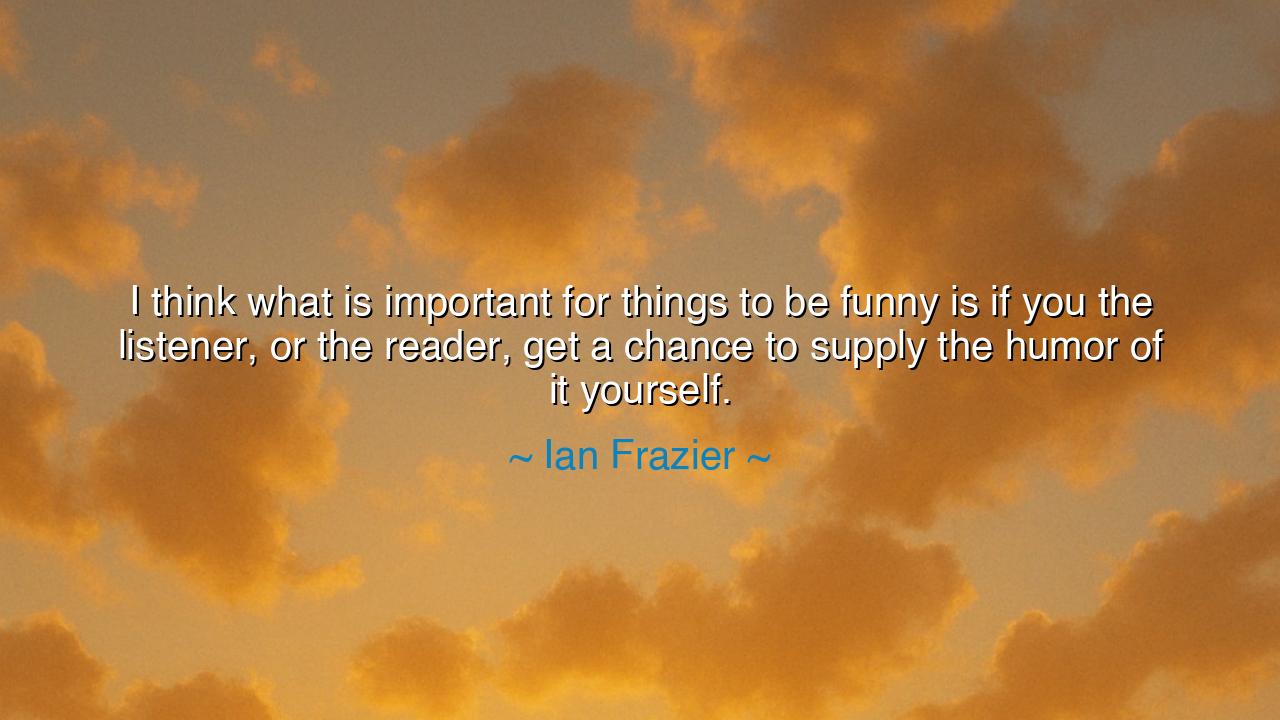
I think what is important for things to be funny is if you the
I think what is important for things to be funny is if you the listener, or the reader, get a chance to supply the humor of it yourself.






Hear the words of Ian Frazier, the quiet observer of life and laughter, who once said: “I think what is important for things to be funny is if you, the listener or the reader, get a chance to supply the humor of it yourself.” In this teaching lies a profound truth—not merely about comedy, but about the human spirit. For Frazier, humor is not something imposed upon the mind, but something awakened within it. True laughter is not a command; it is a revelation. It is the soul’s recognition of something familiar and true, glimpsed suddenly through the veil of the unexpected.
The wise have always known that the deepest joy is the joy one discovers, not the joy one is given. The listener who participates in humor, who fills the silence between words with their own understanding, becomes not a passive recipient but a co-creator. Frazier’s insight reveals that the art of comedy is a dance between the teller and the hearer—a partnership of imagination. When the reader or the listener “supplies the humor,” they join in the act of creation. The laughter that follows is not forced from the outside but blooms from within, like the sudden opening of a flower to the sun.
In the ancient world, the philosophers and poets knew this secret well. Socrates, the master of questions, never told his students the answers they sought; he led them to discover truth for themselves. In this, he shared the same spirit as the humorist. For both the philosopher and the comedian seek awakening, and both understand that revelation born from within is far more powerful than instruction imposed from without. The audience must be trusted to see, to think, and to laugh. Thus, when Ian Frazier speaks of letting the listener “supply the humor,” he calls for humility in the creator and trust in the audience—a faith that the human heart is capable of finding its own joy and insight.
Consider the example of Mark Twain, whose humor has endured through centuries. Twain did not batter his audience with laughter; he led them gently toward it. His jokes were doors left ajar, inviting the reader to step through and find delight on the other side. When he wrote, “The human race has one really effective weapon, and that is laughter,” he knew that this weapon only works when wielded by both sides—the teller who gives the spark, and the listener who lights the flame. Frazier’s wisdom is born from this same understanding: that the best laughter is not the loudest, but the truest; not the most shocking, but the most shared.
The origin of Frazier’s thought lies in his craft as a writer of quiet, observational humor. He has spent a lifetime watching the world—not to mock it, but to notice it. His humor does not shout; it whispers. It invites the reader to complete the picture, to find the comedy hidden in the ordinary. This kind of humor demands patience, intelligence, and empathy. It gives space for the audience to breathe, to think, to see themselves reflected in the absurdity of life. In that moment of recognition, the laughter that follows is not derision—it is understanding.
This teaching extends far beyond the realm of writing or comedy. It reaches into every art, every act of communication, every moment of human connection. To “let the listener supply the humor” is to let others share in creation. It is to leave space for thought, for imagination, for the heart’s own movement. In life as in art, those who demand control over every reaction will never inspire joy. But those who trust others—who speak with openness and humility—awaken something greater than persuasion: they awaken participation.
Let this, then, be the lesson to all who seek to touch others through word, art, or deed: leave room for others to find themselves in your work. Do not explain everything; do not close every door. Whether you teach, write, speak, or love, remember that the listener’s heart must be free to respond. The power of your creation lies not in your mastery alone, but in the space you leave for others to join you. True humor, like true wisdom, is shared. It does not conquer—it connects.
So remember the wisdom of Ian Frazier: laughter that is given may be forgotten, but laughter that is discovered is eternal. The greatest art is not what fills the world with noise, but what awakens silence into song. Therefore, when you speak, when you write, when you live—do not seek to overwhelm, but to invite. Let your words be sparks, not flames, and trust that the hearts of others will carry the fire. For the highest joy, like the truest laughter, is the one we supply ourselves, together.






AAdministratorAdministrator
Welcome, honored guests. Please leave a comment, we will respond soon